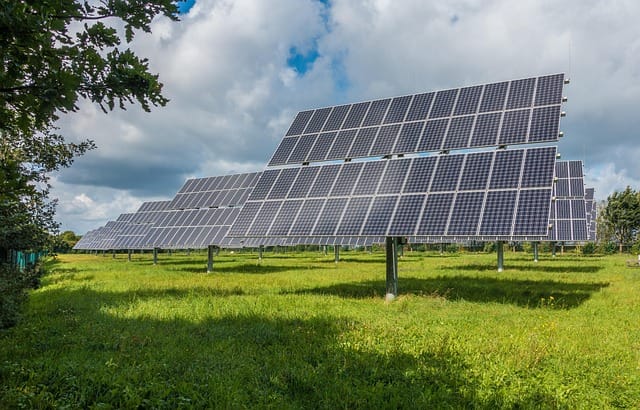As the world struggles with global warming, solar energy brings promise of a cleaner future. Solar energy can change sun energy, a limitless renewable resource, into electricity and heat. Having a good solar kit will help you benefit in many ways and give them many plus points for their utilization. Now you are wondering where you can obtain the best solar kits, then do not worry because Renogy is here to give you quality products within your budget.
Moreover, you can save more with the use of the Renogy discount code. So purchase from Renogy and let’s grab plenty of advantages. But you never know how solar energy affects the environment exactly. The solution is in both its widespread advantages and lesser-known problems of solar technology.
In this article, we will discover the environmental implications of solar power, pointing out how it helps promote sustainability, decreases greenhouse gases, and alleviates climate change while also taking a look at the areas solar production and disposal need to be improved. Let’s proceed therefore and read this until the end.
Enhanced the Quality Of Air
Air pollution from fossil fuels brings not only climate change but also health effects. Power plants emit Sulphur dioxide, nitrogen oxides and particulates and are linked to respiratory diseases, heart disease and pre-mature death.
Solar provides a cleaner alternative without air pollution. It can help you in improving air quality in both, reducing the stress on our healthcare systems and improving quality of life.
Conservation of Water Resources
Electricity generation from nuclear and fossil fuels uses an extreme amount of water, for cooling and other common processes. In areas where water is scarce, the high demand from electricity generation can further strain fresh water resources that we all rely on. But, solar energy does not pollute fresh water supplies and solar energy requires minimal water for cooling compared to conventional power plants that pollute water resources, and ecosystems.
Reducing Air Pollution
The air we breathe has an effect on our health and well-being, either positively or negatively.
Air quality can be degraded from fossil fuel based electricity generation that produces toxic carbon dioxide and methane gases. Breathing polluted air day in and day out can have devastating effects on our health and well-beings. Air pollution is likely the cause of asthma and allergies, bronchitis, pneumonia, headaches, anxiety, increased risk of heart attack and even certain kinds of cancer. With more and more of our electricity generated from the sun, there will be fewer toxic pollutants released from fossil fuels combusted.
Assists to Highlight and Address Climate Change
Climate change is now not tomorrow’s problem, it is now defined by extreme weather patterns, a rising temperature line, and environmental chaos. May be the biggest reason of climate change is the burning of fossil fuels used for electricity. However, when you utilize solar power, you are directly contributing to reducing the consumption of coal, oil, and natural gas, all of which emit ridiculously high levels of greenhouse gases into the atmosphere.
Solar panels provide an observable, real means of taking action. When individuals embrace solar energy at the community level, it sends an incredibly strong signal that communities can actually take part in large-scale environmental change. Each solar installation is another step in moving away from fossil fuels and more toward a greener future.
Lower Household Carbon Footprint
The carbon footprint of your home represents the total amount of greenhouse gases released into the atmosphere from your energy use on a daily basis, such as lighting, heating, and powering appliances. You can greatly reduce this footprint with solar panels.
Solar panels, once installed, produce emission-free energy when compared to conventional electricity generated from carbon-intensive sources. For example, an average residential solar system saves 3 to 4 tons of carbon dioxide every year. This is equivalent to planting greater than 100 trees per year. Over the 25–30 life span of a solar system, that impact becomes significant.
Save Money On Power Bills
Aside from the environmental advantages, solar power also saves you money. When you generate your own electricity, you are less dependent on your utility company, and in most situations, you can even sell surplus electricity back to the grid through net metering.
This leads to lower monthly expenses, and sometimes houses with solar panels cut out their electric bill altogether. With electricity rates ongoing upward, committing to lower costs with solar is a great long-term investment. And federal and local incentives can lower your upfront expense and hasten your payback period.
Better For The Environment
Just like other natural energy sources, solar energy can beat fossil fuels hands-down when it comes to air pollution, water pollution, explicitly destructive extraction processes, and toxic waste. And unlike other natural sources of energy, solar panels generate clean energy for several decades with very little maintenance after installation.
By diminishing dependence on conventional electric resources, you are also reducing the contribution to environmental degradation caused by mining, drilling, and transportation of fuels. As recycling technology for solar panels evolves, the solar sector is advancing and getting closer to a life cycle that is as little impact on the environment as possible.
Conclusion:
Solar power is no fad; it’s a legitimate way to reduce carbon footprint, reduce your energy costs, and gain energy independence at home. With all of us bearing the brunt of global warming, going solar is a valuable step toward being part of global energy transition. Energy independence starts at home, and the sun is ready to shine light on your future.


